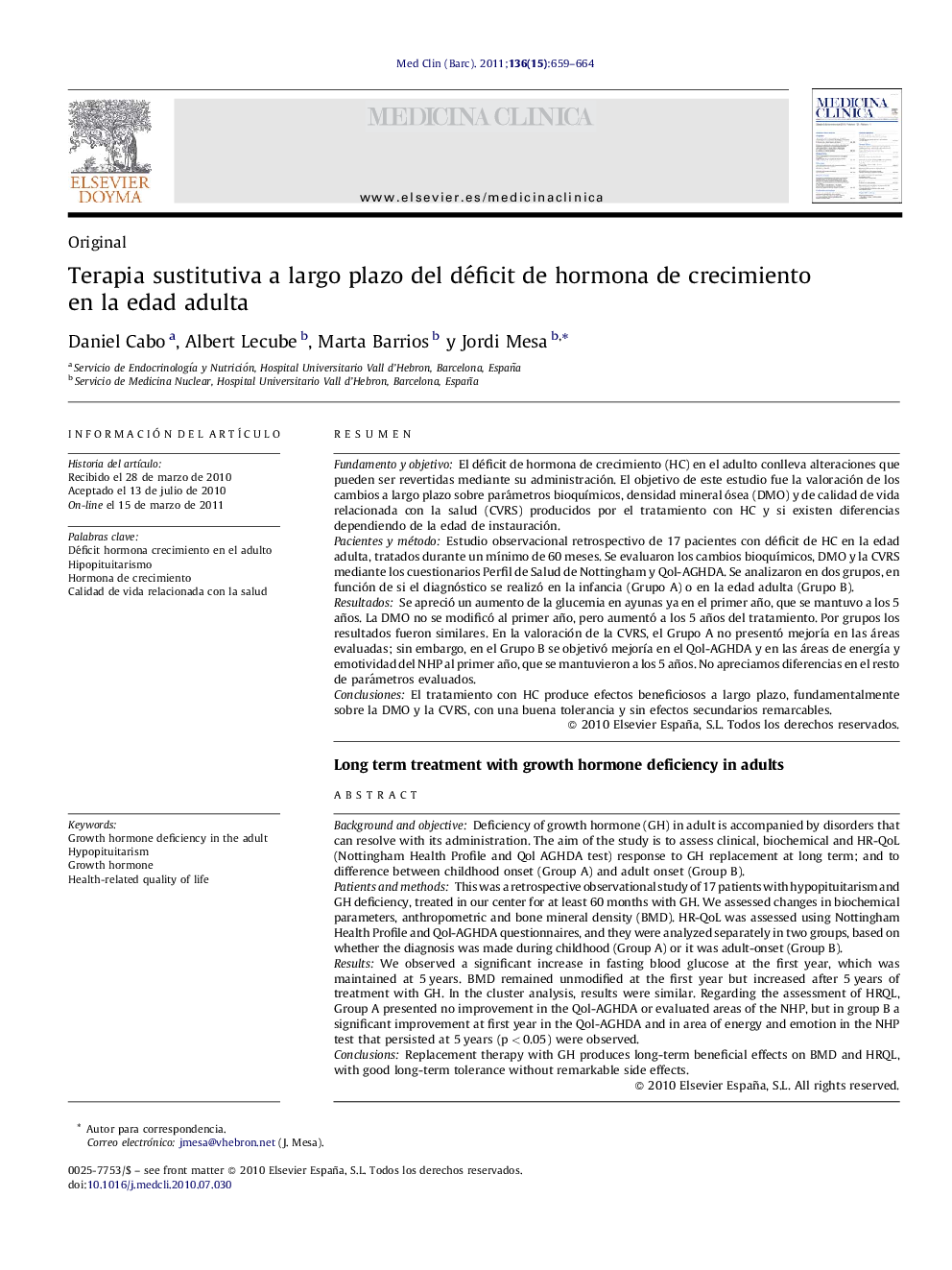| Article ID | Journal | Published Year | Pages | File Type |
|---|---|---|---|---|
| 3800356 | Medicina Clínica | 2011 | 6 Pages |
ResumenFundamento y objetivoEl déficit de hormona de crecimiento (HC) en el adulto conlleva alteraciones que pueden ser revertidas mediante su administración. El objetivo de este estudio fue la valoración de los cambios a largo plazo sobre parámetros bioquímicos, densidad mineral ósea (DMO) y de calidad de vida relacionada con la salud (CVRS) producidos por el tratamiento con HC y si existen diferencias dependiendo de la edad de instauración.Pacientes y métodoEstudio observacional retrospectivo de 17 pacientes con déficit de HC en la edad adulta, tratados durante un mínimo de 60 meses. Se evaluaron los cambios bioquímicos, DMO y la CVRS mediante los cuestionarios Perfil de Salud de Nottingham y Qol-AGHDA. Se analizaron en dos grupos, en función de si el diagnóstico se realizó en la infancia (Grupo A) o en la edad adulta (Grupo B).ResultadosSe apreció un aumento de la glucemia en ayunas ya en el primer año, que se mantuvo a los 5 años. La DMO no se modificó al primer año, pero aumentó a los 5 años del tratamiento. Por grupos los resultados fueron similares. En la valoración de la CVRS, el Grupo A no presentó mejoría en las áreas evaluadas; sin embargo, en el Grupo B se objetivó mejoría en el Qol-AGHDA y en las áreas de energía y emotividad del NHP al primer año, que se mantuvieron a los 5 años. No apreciamos diferencias en el resto de parámetros evaluados.ConclusionesEl tratamiento con HC produce efectos beneficiosos a largo plazo, fundamentalmente sobre la DMO y la CVRS, con una buena tolerancia y sin efectos secundarios remarcables.
Background and objectiveDeficiency of growth hormone (GH) in adult is accompanied by disorders that can resolve with its administration. The aim of the study is to assess clinical, biochemical and HR-QoL (Nottingham Health Profile and Qol AGHDA test) response to GH replacement at long term; and to difference between childhood onset (Group A) and adult onset (Group B).Patients and methodsThis was a retrospective observational study of 17 patients with hypopituitarism and GH deficiency, treated in our center for at least 60 months with GH. We assessed changes in biochemical parameters, anthropometric and bone mineral density (BMD). HR-QoL was assessed using Nottingham Health Profile and Qol-AGHDA questionnaires, and they were analyzed separately in two groups, based on whether the diagnosis was made during childhood (Group A) or it was adult-onset (Group B).ResultsWe observed a significant increase in fasting blood glucose at the first year, which was maintained at 5 years. BMD remained unmodified at the first year but increased after 5 years of treatment with GH. In the cluster analysis, results were similar. Regarding the assessment of HRQL, Group A presented no improvement in the Qol-AGHDA or evaluated areas of the NHP, but in group B a significant improvement at first year in the Qol-AGHDA and in area of energy and emotion in the NHP test that persisted at 5 years (p < 0.05) were observed.ConclusionsReplacement therapy with GH produces long-term beneficial effects on BMD and HRQL, with good long-term tolerance without remarkable side effects.
